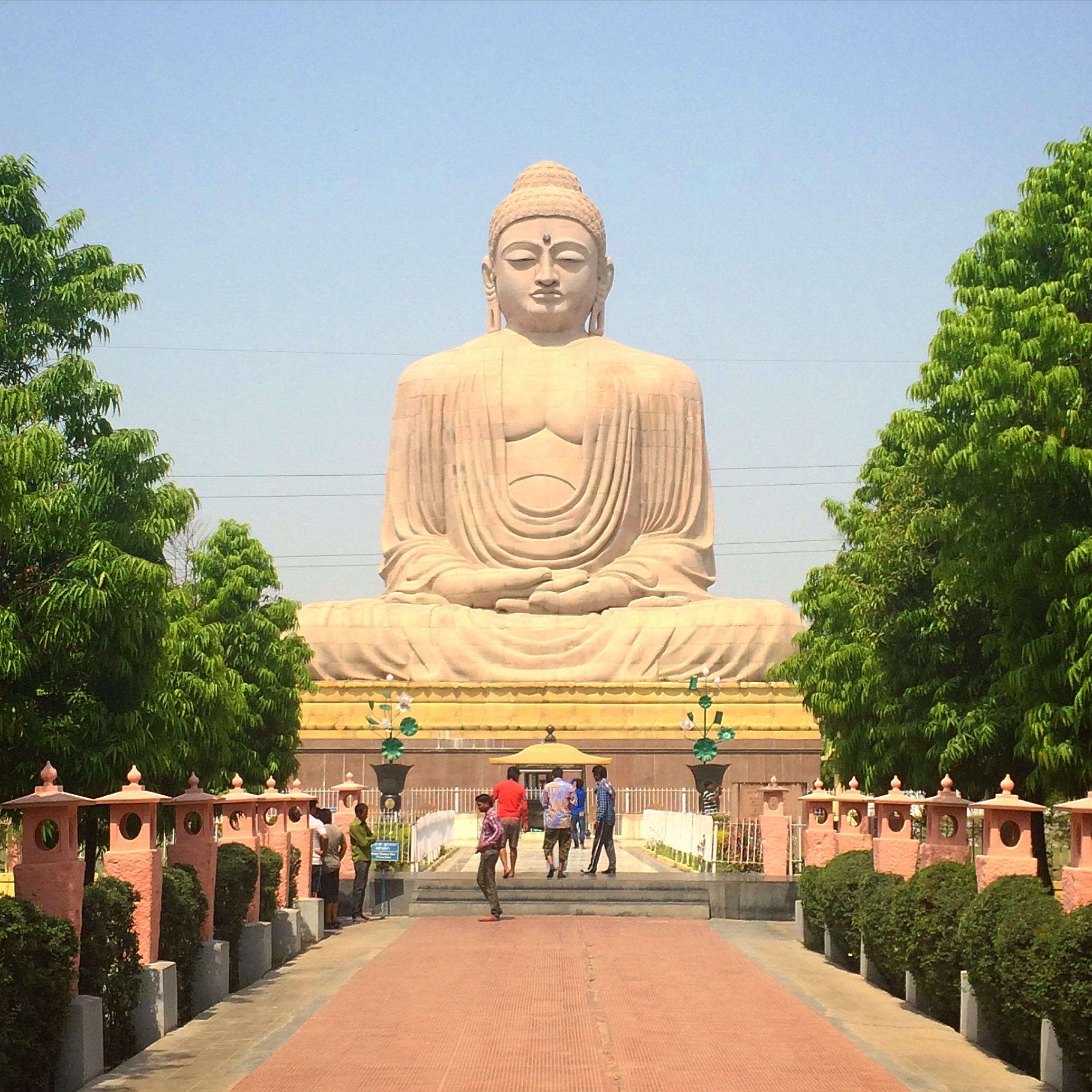Since arriving in India I’ve learned a great deal about my self and question a great many things in my own life. To see firsthand a culture and environment so drastically different than the one I’m familiar with back home is a tremendously eye-opening experience. A few posts ago I told you about the 10-day silent meditation retreat up in Dharamsala at Tushita. I only have glowing reviews about the course, and it inspired me to sign up for another, far more intense, 10-day silent meditation retreat through Vipassana.
In the Buddhist tradition, Vipassana means an insight into the true nature of reality that is characterized by the three marks of existence: impermanence, suffering, and non-self. The goal of the Vipassana course is to gain an understanding of reality through direct experiences as opposed to intellectual reasoning. Unlike in Tushita, Vipassana participants observe the Noble Silence that means no talking, no electronics, no reading, no writing, no eye contact, and segregation between the sexes. Days at Vipassana begin at 4:00 am, end at 9:00 pm, and you spend 10+ hours per day sitting on the floor in silent meditation for ten straight days!
Sounds terrifying, but it’s actually an incredible experience.
I highly recommend Vipassana to everyone I meet and, if you're interested, I encourage you to visit their site to learn more. There are over 200 centers across the world and everything runs off donations; there is no charge for the teachings, room, or board. Even though the Buddha taught Vipassan meditation, the practice it is not Buddhism. Vipassana is simply a new way of experiencing the world around you and if you don’t like what you learn at the end of the ten days then you can forget about it entirely (although I doubt you’ll want to). Looking back, both Vipassan and Tushita have greatly impacted how I view the world and, if you know what to look for, you can see their influence in my writing. I could write volumes on what I learned over the collective 20 days of my life, but I wanted to outline five biggest things I learned from my Vipassana class for my readers back home.
Sitting is Hard
In all my 25 years of existence, I have never encountered anything quite as difficult, painful, or frustrating as trying to sit still for just one hour and focus singularly on my breath. For something so obviously simple, I’m mesmerized by how unbelievably hard it is to do. In society we glorify multitasking, yet for most of us it is infinitely more difficult to just quietly sit still! I feel like a child with ADHD! At the end of the course I came to realize just how significant and true the following quote by Blaise Pascal is in life:
“All of man’s difficulties are caused by his inability to sit quietly in a room by himself."
It’s All in Your Head
The reality we, as humans, experience on a daily basis is not actually reality - at most it is a very small, very limited slice of true reality. I’m reminded of the old Matrix movies, but if you could hypothetically replicate your five senses and thoughts in a virtual world, would you be able to tell the difference between physical reality and digital reality? You wouldn’t, because your consciousness is the result of your mind seamlessly stitching together input from your five senses and incorporating it your thoughts to create the “world” you live in. There is a whole other realm of reality that humans can never experience because there is now way for us to sense it or think of it conceptually.
Never Push Your Ideas/Beliefs onto Others
If your philosophy, idea, or belief is as great as you claim it to be, there is absolutely no reason why you should ever have to force it on to others. The best way to spread such ideas or beliefs is to live them in your own life; people will naturally be drawn to your words and inspired by your actions. Instead of following the hypocritical “do as I say, not as I do” mentality, you should strive to, as Gandhi put it, “Be the change you wish to see in the world.” The clearest example of this issue in history was in East Germany after WWII when the Berlin Wall was erected to prevent citizens from leaving the communist side of the city to the capitalist side. If communism is so great, why did they have to build a wall to keep people from leaving? In the modern day this applies to everything from religion, to political ideas, to economic principals, and everything in between.
We are Addiction to Sensations
This is closely tied to the concept of attachment, but Vipassana provided a fascinating new perspective. We are not actually attached to people, tangible objects, money, power, etc. specifically, we are attached to the sensations these things trigger inside us. Think about the first time you truly fell in love; what did you miss most when the relationship ended? Was it the specific person, or the feeling you experienced? Be honest with yourself on this, because I’m willing to bet that what you missed the most was not the person, but the sensation you felt.
While we shun people who are addicted to drugs like cocaine or heroin, you’re attachment to tangible things in life is no different. Think about it, the sensation you get from buying the newest BMW sports car slowly fades just like a hit of cocaine. Over time you develop a tolerance for the BMW and need make a bigger the purchase (or take a larger the dosage of cocaine) to achieve the same high. In both scenarios, the sensation eventually fades and you once again begin your seemingly uncontrollable search for the next high. Let your sensations just be. Some are good, some are bad, but at the end of the day they all pass.
Humanity's Ironic Quest for Happiness
Our minds are split in two; the subconscious mind is responsible for regulating internal matters of the body (immune system, fight-or-flight response, etc.) through feelings while the conscious mind regulates external matters (planning for the future, conceptual thinking, etc.) through thoughts. At first you may not care, until you realize there are great difficulties in communicating between the two minds. Have you ever walked into a room and immediately felt uncomfortable for some inexplicable reason? You know you have to leave, but you can’t put it into words why exactly. That’s the communication breakdown in action, and it works in reverse too.
Here’s where our confusion with happiness occurs: because we spend all of our time in the realm of conscious thought, we naturally believe happiness lies somewhere outside the body even though it is an internal feeling. Since we rely so heavily on our conscious mind, we mistakenly think that things in the external world make us happy when in fact. The truth is, we allow such things to make us happy; however, they are not the source of our happiness - we are. Happiness is a feeling generated by the mind and it is ironic the very mind that constantly seeks happiness is somehow totally unaware that it is the source of that very feeling.
“You” are a Rainbow
This is the by far the most important revelation I came to on my retreat. The illusion of self is one of the most stereotypical Buddhist concepts out there, but one that people find tremendously difficult to understand. How can there be no me? I’m still in the process of wrapping my head around it, but I heard a very insightful analogy that shed some light on both the illusion of self and death: “You” are a rainbow.
Physically, all a rainbow “is” is a refraction of light on trillions of tiny droplets of water hanging in the air. Individually, the rainbow is not the light, nor the water, and it’s not you (the observer) - it is the combination of those variables that gives rise to a rainbow. If even one of those factors is missing, a rainbow cannot “exist.” This same applies to you: individually, you are not the air in your lungs, the food in your stomach, the cells in your body, or the thoughts in your head - it is the combination of those variables that gives rise to “you.”
Now here’s where it gets a little unnerving: once the sun evaporates the water in the air, where does the rainbow go? Does it run away, hide, or go somewhere else? Like the tiny droplets of water, the rainbow simply evaporates. The whole thing was an illusion; nothing was ever really there in the first place, so nothing was lost. The rainbow arose when the conditions were right, and vanished when those conditions changed. We “exist” - both as an individual and as a society - when the conditions are right and we vanished once those conditions fall out of balance. Like the rainbow, "you" don’t go anywhere when you die, because there was never really anything there in the first place. There is no “I,” only the illusion of self.

